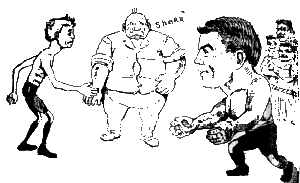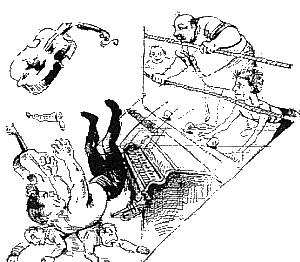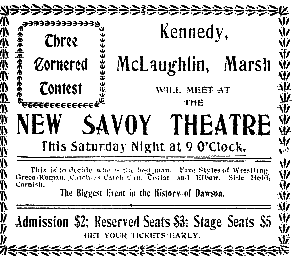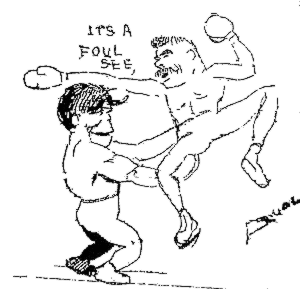
"Shake," from Klondike Semi-Weekly Nugget, August 31, 1901.
From left to right, Joe Carroll, J.H. McLaughlin, and Frank Gotch
By Mark S. Hewitt
Research in Dawson Daily News by Don Luce. Research in Klondike Daily Nugget and Klondike Semi-Weekly Nugget by Bill Taylor.
Copyright © EJMAS 2001. All rights reserved.
During the summer of 1901, Frank Gotch wrestled in the Klondike. As Gotch went on to become one of America's most famous professional wrestlers, it is surprising that this portion of his career has not received greater scrutiny, and this article is an effort to correct that omission.
Admittedly there is the possibility that Gotch took part in impromptu matches toward establishing his credibility, but organized matches would have been held in a theater, gym, or saloon and would have received coverage by the news-hungry media. Therefore the following list of records is believed reasonably complete.
Before and after the Yukon trip, both Gotch and his manager Joe Carroll, who was then using the name Ole Marsh, were members of Farmer Burns' troupe. While there are some indications that Gotch was simply a happy-go-lucky farm kid out on a lark, Carroll, perhaps with Burns' arrangement, was pulling what was known as the "badger game." In this oft-used pro wrestling scam of that era, Carroll would show up in a gold rush boomtown such as Dawson City in the Yukon Territory and proclaim himself "the champion of the Yukon." He would then orchestrate a series of challenge and "grudge" matches between himself and other wrestlers, in this case Col. J.H. McLaughlin and Gotch. McLaughlin had been a pro wrestler since the post- Civil War period and claimed the world collar and elbow championship since 1870. Gotch meanwhile was the "ringer." His cover was that of "Frank Kennedy" of Springfield, Missouri, and he was a Filipino-American War veteran prospecting for gold.
Following several matches that drew big crowds and generated lots of wagering, Carroll and Gotch left the Yukon Territory, and in February 1902 they appeared in Omaha for a series of bouts involving Farmer Burns and a pair of "Terrible Turks." Later that same year, Gotch was back wrestling in the Pacific Northwest as "Frank Kennedy." At this time, it is unknown if he made it back up to Dawson City, but during 1903-1904 he was in Bellingham, Washington, where he held a US championship match with Tom Jenkins.
While in the Pacific Northwest, Carroll served as Gotch's manager. But, after Gotch went on to defeat American champion Tom Jenkins, world champion George Hackenschmidt, and all other challengers, he and Carroll parted ways. Carroll remained in the Seattle area, where he wrestled, promoted, and managed wrestlers such as Dr. B. F. Roller and Bert Warner. However, in 1910 Carroll was arrested, tried, and convicted as part of the Maybray Gang, a nationwide group of swindlers led by John C. Maybray that scammed at least $2,000,000 over a two-year period by fixing wrestling and boxing contests as well as horse and foot races. In this organization, Carroll's role was that of a "steerer." In other words, it was his job to locate suckers and steer them to bet on a contest. Carroll would assure the "mark" of the result and then fleece him out of his wager. After serving a prison sentence in Leavenworth, Carroll returned to the wrestling business and as J.C. Marsh barnstormed the country, first with Marin Plestina and then with Jack Sherry.

July 24, 1901. Ole Marsh (Joe Carroll) issued a challenge to wrestle Frank Kennedy (Frank Gotch) at catch-as-catch-can style for $1000 a side "in public or in private." Marsh added. "If challenge is not accepted I will ignore all further bluffs."
July 26, 1901. Ole Marsh, "the Terrible Swede," and "the champion wrestler of the Yukon," weighing 190 lbs., and Col. J.H. McLaughlin, "collar and elbow champion of the world," and "champion of champions," weighing 230 lbs., signed articles to wrestle a collar and elbow contest. The first fall was to be in jackets, second fall in harness, style of the third fall if necessary to be picked by the wrestler who won the fastest fall. "The winner of the contest to take all the gate receipts." Marsh had spent the last year touring with Farmer Burns.
August 14, 1901. At the Orpheum Theater in Dawson City, Frank Kennedy, "of Springfield, Illinois," weighing192 lbs., beat Vincent White, "of San Francisco," weighing 175 lbs." It was a handicap match in which Kennedy agreed to throw White three in one hour at catch-as-catch-can style. Kennedy "won all three falls in about 18 ½ minutes." The referee was Ole Marsh. According to these reports, "Kennedy is a recent arrival... for three years a member of the United States volunteers... [he] saw considerable service both in Porto Rico and the Philippines....He stated he was here to wrestle any and all comers and offered to take on both Frank Archer and Billy Murdock in the same ring one after another; he would bet any amount of money he could throw Ben Trenneman 10 x in an hour and issued a challenge to Ole Marsh for a purse of $1000 a side." (Archer was probably Silas Archer, a black wrestler known locally as the Colored Strangler. Despite later stories, there is no contemporary account of Gotch and Archer actually meeting.) Col. McLaughlin was introduced to the crowd before the contest, and afterwards, Marsh accepted Kennedy's challenge "any time, today, tomorrow or in 6 weeks for $1000 to $2500...in private with three men on a side."
August 15, 1901. Frank Kennedy and Ole Marsh signed articles to wrestle in private, "one pin fall, catch-as-catch-can Police Gazette rules...before no more than 20 persons...for a side bet of $1000." The match was tentatively scheduled for September 4.
August 16, 1901. At the Standard Theater in Dawson City, Col. J.H. McLaughlin defeated Ole Marsh. In the first fall, with jackets, McLaughlin won in 7:22. The second fall, in harness, was won by Marsh in 13:22. The third fall, in jackets, was won by McLaughlin in 9 minutes. The referee was Leroy Tozier. The papers considered it "the most interesting and exciting wrestling match ever occurring in this city...a big house witnessed the event."
August 19, 1901. At the Orpheum, the week's vaudeville performances included wrestling exhibitions between Ole Marsh and Jean Riley.
August 30, 1901. At the Standard, Ole Marsh defeated Frank Kennedy in a one-fall contest billed as "The Great Challenge Wrestling Match." The referee was Col. McLaughlin. In this bout, Marsh threw Kennedy through the ropes and into the orchestra pit using what later became known as the Beell Throw. Kennedy climbed back into the ring but was caught with a body hold, tossed face down, and pinned with a hammerlock. The match ended in 22 minutes. Kennedy was described as "remarkably agile as well as having an exact knowledge of the game." Reportedly $3000 changed hands on the outcome of the match, and "The Standard theater probably never held a larger crowd than that which witnessed the event."

August 31, 1901. At the Gymnasium, Ole Marsh threw both Yonson, "a big Swede employed at the Fairview hotel," and Jean Riley. Marsh had bet $50 he could toss the pair within 5 minutes; Yonson lasted 45 seconds, Riley lasted a little over a minute. The referee was Jack Merritt.
September 7, 1901. Ole Marsh issues a statement in which he said he had wrestled in over 300 contests, " all honestly contested," and "he defied anyone to refer to him as ever being mixed up in hippodrome," adding, "'When I give exhibitions I advertise them as such.'"
September 13, 1901. At the Savoy Theater in Dawson City, Ole Marsh again beat Frank Kennedy. The promoter was John Mulligan and the referee was Col. McLaughlin, and the prize was $1000 Kennedy won the first fall at 14:20. According to the papers, Kennedy had Marsh clearly pinned three times before the referee finally called a fall. In the second bout, Kennedy threw Marsh with a flying fall but the ref disallowed it despite the protests of Kennedy and his seconds. Then Marsh pinned Kennedy with a half Nelson to take the fall in 11:31. Marsh gained the third fall in 29:20, after feinting with a hammerlock and then again using a half Nelson. "Some peculiar things happened during the progress of the match," said the paper, to include "the evidence of money ready to be wagered on Marsh even after he lost the fall...[and] Kennedy disappointing his friends by not using many locks which it is known he is thoroughly familiar with. To those who won money on the event the go was perfectly satisfactory...Those who lost on Kennedy, however, tell another story... In all matches there are many people who cry 'fake' and no few of them are doing so today...If it should be shown that the go was a hippodrome the victims can console themselves with the reflection that they lost money against a game which for cleverness of work and detail of preceding events has never been equaled in the history of the sport...Kennedy says that in the event of his winning the contest he would challenge Frank Slavin to box a 15- round go for a purse of $1000 a side, the winner to take all, including the gate receipts....By the way who is Kennedy?"
September 17, 1901. Kennedy claimed to have been "robbed" in his second match with Marsh and called referee McLaughlin "crazy," saying, "He evidently don't know what a pinfall is." Kennedy further reiterated his challenge to box Slavin.
September 17, 1901. Articles were signed for a match to be held September 26 at the Orpheum between Jack Young "of Quincy, Illinois" and Zink Swanson, "the Nanaimo lad," to determine the welterweight wrestling championship of the Yukon. Young issued a sweeping challenge to face anyone in the Yukon within seven pounds of his weight for $1000 a side.
September 18, 1901. At the Bonanza Saloon in Dawson City, Frank Kennedy and Frank Slavin met to sign articles of agreement for their upcoming boxing match, which was to be "15 rounds to a decision, under Marquis of Queensbury rules... At one time it looked as though the match was off as Slavin insisted on making a side bet which Kennedy was not prepared to cover. The latter said that in the event of his winning the coming wrestling match [a three man tournament with Marsh and McLaughlin] he would put up all the money less $150, the same to be applied to his passage out of the country and further that he would agree to box Slavin winner take all."

September 21, 1901. At the New Savoy Theater in Dawson City, a "three cornered contest," billed as "The Biggest Event in the History of Dawson," was held. The match was "to decide the best man. Five styles of wrestling Graeco-Roman, catch-as-catch-can, collar and elbow, sidehold, Cornish." The participants were Frank Kennedy, Ole Marsh, and "the mighty" Col. McLaughlin. The referee was Leroy Tozier, and the rules called for the three men to wrestle alternatively with styles decided by ballot until one man had been thrown twice, the remaining two to wrestle in the final. If one contestant gained two falls he drew a bye until one of the others had been eliminated. In the first fall, McLaughlin beat Marsh, collar and elbow with jackets, in minutes, using a cross buttock throw. In the second fall, Kennedy threw McLaughlin, Cornish style with jackets ("this style of wrestling allows the free use of the hands to any grip on the jacket."). Kennedy's technique involved pulling the jacket over McLaughlin's head, then choking him to his knees. McLaughlin broke free and regained his feet, only to be taken down and rolled for a pin. In the third fall, Marsh beat Kennedy in catch in 4:05. Both men were very aggressive, but Marsh took Kennedy with a rush, secured a back arm hold, and pinned him. In the fourth fall, Marsh defeated McLaughlin in sidehold. In this method of wrestling, the men each wore a belt and a ring, and had to grasp the belt and ring worn by the other. Marsh used a hip roll to throw the Colonel, thus eliminating him from the contest. This led to some confusion, however, as Marsh had two victories and one loss, McLaughlin had one win and two losses, and Kennedy had one win and one loss. Therefore Kennedy volunteered to face McLaughlin in Greco-Roman style, stipulating that if he lost, he would get another chance. In this fifth all, Kennedy beat McLaughlin in the Greco-Roman style, in which there were "no leg holds allowed." "At last McLaughlin went to the mat and there suffered a furious onslaught, Kennedy getting in the roughest kind of work, one arm choke lock, chin hold and finally threw him with a half-hammerlock." In the sixth fall, Kennedy beat Marsh at catch. Both men were aggressive throughout, "rushing, tossing each other into ropes...Kennedy lifted the Swede bodily and by sheer strength threw him on the mat. Like a tiger he was on top and then followed a fierce struggle in which Kennedy exhausted himself with violent lunges... catching a waist hold he bore Marsh to the mat with a Cornish heave, then changing to crotch lock...brought him to a bridge...Ole threw his leg over the rope and held on...notwithstanding the repeated cries of Kennedy the referee failed to see the move...Marsh broke away before the discovery...Kennedy... tore after his man like a maddened bull, hurling him in the air...forcing him to the ropes, dashing him to the mat he got a half Nelson" and worked it into a pin. Kennedy was proclaimed " the champion of champions." Marsh acknowledged his defeat and said he would make no claim to being "robbed." "The men will probably never meet again in this country," said the paper, "as Kennedy will go outside, after his match with Slavin."
September 24, 1901. Col. J.H. McLaughlin challenged Kennedy to wrestle " a fair, square match, collar and elbow...for the entire gate receipts of the house." He further offered to give Kennedy $100 if Kennedy gained even one fall.

September 25, 1901. Frank "Paddy" Slavin boxed Frank "The Young Hercules" Kennedy at the New Savoy Theater in Dawson City. It was a 15 Round Glove Contest...No Draw Goes...Winner Take All" affair fought for a $1,000 side bet. The referee was Leroy Tozier. Slavin's money was guaranteed by Klondike Joe Boyle. Slavin was confident of winning, saying before the match, "If he's a 'ringer,' he must have blown in from South Africa or China or some other heathen town. I'll smash his face." During the first round, said the paper, "Kennedy was not in it for a minute, as Slavin had him entirely at his mercy from the call of time (although) Kennedy delivered two stiff jabs to the jaw which dazed (Slavin)." In the second, Slavin fouled Kennedy by delivering a blow after the call of time. "Kennedy to retaliate threw Slavin to the floor...Tozier declared...a foul and awarded the contest to Slavin...By the rules of the game the decision was just but Tozier made a mistake for he should have passed it up with a warning as rules or no rules the people who pay their money are the ones who come first, the fighters after. The game should have been allowed to progress and if Kennedy was overmatched he should have been compelled to take his medicine. Who is Kennedy? The question was answered last night by Slavin. His name is mud." In the preliminary, a three-round exhibition, the fighters were Caribou Sinclair and Smith.
Gotch and Marsh left Dawson City soon after this match, and in the eyes of some, none too soon. For example, on October 11, at the Old Savoy Theater, Joe Burns beat L.M. Murphy in a handicap match. Both men weighed 135 pounds, and "Burns agreed to throw his opponent four times in one hour." Burns won three falls in thirty minutes, "then Murphy forfeited, sick from the rough handling of his opponent." According to the paper, the match was "poorly attended, owing to the number of fakes pulled off recently."
As for Slavin's pugilistic prowess, on April 24, 1902, he fought Nick Burley at the Orpheum for the championship of the Yukon. The result was Burley by TKO in the sixth.
"Gotch in Talk of Dawson," Yukon World, March 24, 1907, reprinted at http://ejmas.com/jcs/jcsart_YukonWorld_1199.htm
Svinth, Joseph R. "Benjamin Franklin Roller -- A Pioneer of Angles and Feuds," InYo, http://ejmas.com/jalt/jaltart_svinth_0700.htm.
JManly